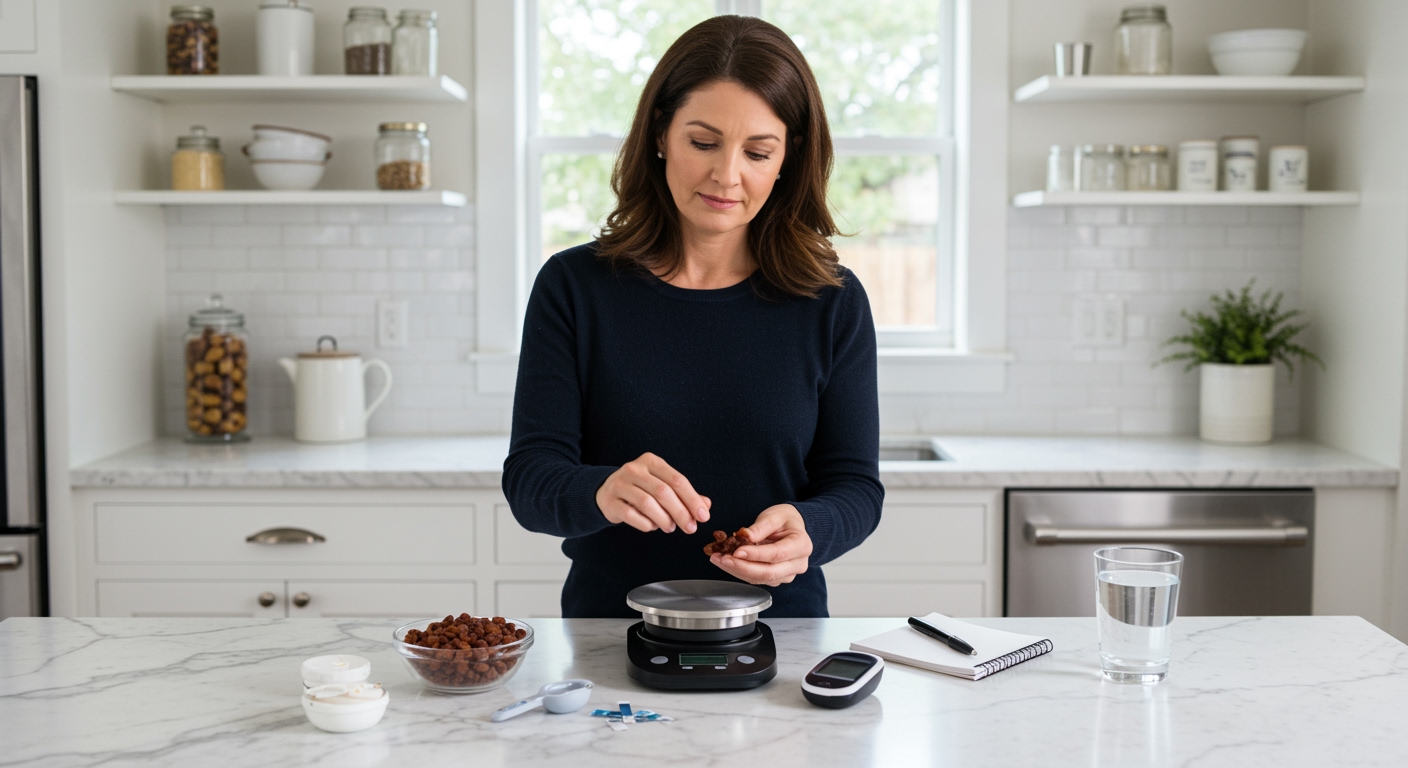✪ Key Takeaway: Raisins can be safe for diabetes when eaten in small portions of 1-2 tablespoons, paired with protein or fiber.
Introduction
You reach for a handful of raisins as a quick snack, then suddenly worry about your blood sugar spiking through the roof.
Many people with diabetes face this exact dilemma because raisins seem healthy but contain concentrated natural sugars that can affect glucose levels.
Hi, I’m Abdur, your nutrition coach and today I’m going to explain exactly how raisins affect your blood sugar and share the safest ways to include them in your diabetic meal plan.
How Do Raisins Affect Blood Sugar Levels?
Raisins have a moderate glycemic index of around 64, which means they can raise your blood sugar faster than many other fruits.
When grapes are dried into raisins, their natural sugars become highly concentrated in a much smaller package.
A quarter cup of raisins contains about 29 grams of carbohydrates and 25 grams of sugar, which is equivalent to eating about one cup of fresh grapes.
Your body absorbs these concentrated sugars quickly, causing your blood glucose to rise within 15-30 minutes of eating them.
However, raisins also contain fiber and antioxidants that can help slow down sugar absorption compared to processed sweets.
The key difference lies in portion control and how you combine raisins with other foods in your meal.
✪ Fact: One tablespoon of raisins contains the same amount of sugar as one medium apple.
What Makes Raisins Different From Other Dried Fruits?
Raisins stand out among dried fruits because they contain natural compounds that may actually benefit people with diabetes.
Research shows that raisins contain tartaric acid, which can help improve insulin sensitivity and glucose metabolism in your body.
Unlike many other dried fruits that are treated with sulfur dioxide or added sugars, most raisins are simply sun-dried grapes without extra chemicals.
The antioxidant content in raisins, particularly resveratrol and flavonoids, may help protect your blood vessels from diabetes-related damage.
Studies indicate that people who eat small amounts of raisins regularly show better postprandial glucose responses compared to those eating other sweet snacks.
However, raisins still pack more concentrated sugar per serving than fresh fruits, making portion size absolutely critical for blood sugar management.
✪ Pro Tip: Choose organic raisins without added oils or preservatives for the cleanest blood sugar impact.
What Is The Safe Portion Size For Diabetics?
The safe portion size for raisins when you have diabetes is 1-2 tablespoons, which equals about 15-30 grams.
This small serving contains approximately 15 grams of carbohydrates, which counts as one carb exchange in most diabetic meal plans.
Many people make the mistake of eating raisins by the handful, which can easily add up to 60-90 grams of carbohydrates in one sitting.
Your best strategy is to pre-measure your raisin portions into small containers or bags to avoid mindless overeating.
Consider using raisins as a flavor enhancer rather than a main snack by sprinkling them on oatmeal, yogurt, or salads.
If you want to eat raisins as a standalone snack, pair them with protein or healthy fats like nuts or cheese to slow sugar absorption.
Always test your blood sugar 1-2 hours after eating raisins to understand how your body responds to this particular food.
✪ Note: Individual blood sugar responses vary, so monitor your levels to find your personal tolerance.
When Is The Best Time To Eat Raisins?
The timing of raisin consumption can significantly impact your blood sugar response and overall diabetes management.
Your best option is eating raisins as part of a balanced meal rather than as an isolated snack between meals.
Morning consumption works well because your insulin sensitivity is typically higher after an overnight fast, helping your body process the natural sugars more effectively.
Avoid eating raisins late in the evening when your metabolism slows down and glucose tolerance naturally decreases.
Pre-workout timing can be beneficial because your muscles will use the quick energy from raisin sugars during physical activity.
Never eat raisins when your blood sugar is already elevated, as this can cause dangerous glucose spikes that take hours to normalize.
If you experience low blood sugar episodes, small amounts of raisins can serve as an effective natural treatment to raise glucose levels quickly.
✪ Pro Tip: Eat raisins within 30 minutes before exercise to use their natural sugars as immediate fuel.
Are There Better Alternatives To Raisins?
Several fresh fruit alternatives provide sweetness with less concentrated sugar and better blood sugar control than raisins.
Fresh berries like blueberries, strawberries, and raspberries offer natural sweetness with more fiber and lower glycemic impact per serving.
A small apple or pear provides similar satisfaction as raisins but with more water content and fiber to slow sugar absorption.
If you prefer dried fruits, consider unsweetened dried cranberries or freeze-dried fruits that retain more volume with less concentrated sugar.
Nuts and seeds can replace raisins in recipes while adding protein, healthy fats, and minimal carbohydrate impact on blood sugar.
For baking and cooking, you can substitute raisins with chopped fresh fruits or sugar-free alternatives that provide texture without the glucose spike.
However, if you genuinely enjoy raisins and can control portions effectively, they remain a better choice than processed candies or artificial sweets.
✪ Fact: Fresh grapes contain 80% water, making them less likely to cause blood sugar spikes than raisins.
The Bottom Line
Raisins can be part of a diabetic diet when consumed mindfully in small portions of 1-2 tablespoons, preferably paired with protein or fiber-rich foods.
Smart portion control beats complete food elimination every time, and understanding how your body responds to different foods empowers you to make better daily choices.
I would love to hear about your experiences with raisins and blood sugar management, so please share your questions, success stories, or concerns in the comments below.
References
At NutritionCrown, we use quality and credible sources to ensure our content is accurate and trustworthy. Below are the sources referenced in creating this article:





